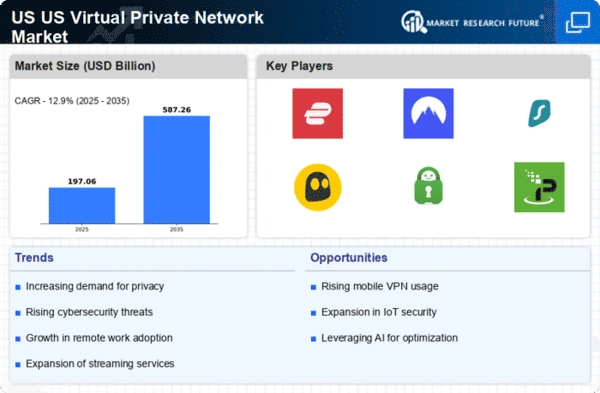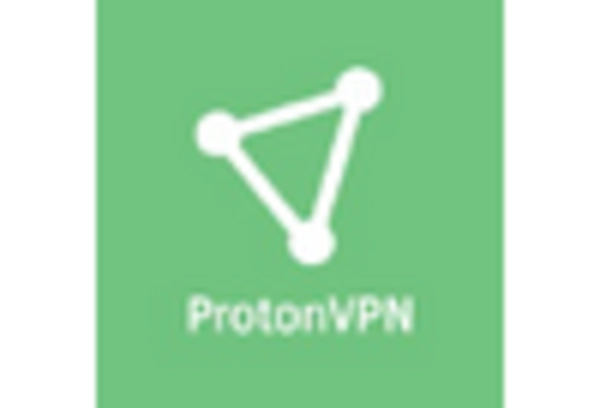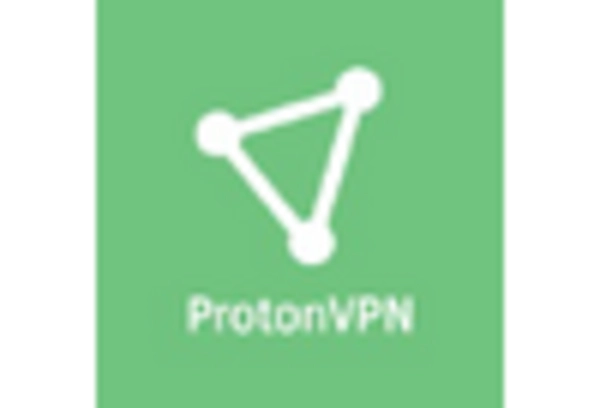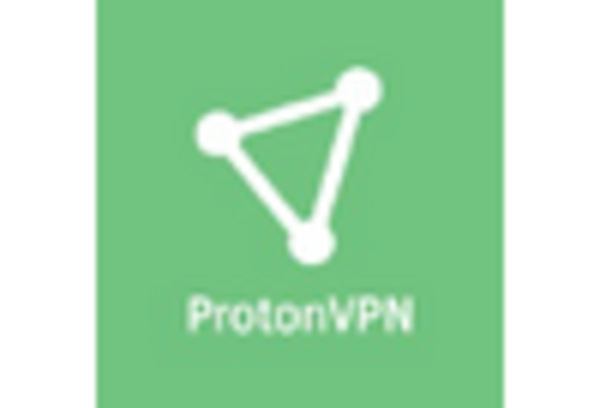Growing Cybersecurity Concerns
The US Virtual Private Network Market is experiencing a surge in demand due to escalating cybersecurity threats. With data breaches and cyberattacks becoming increasingly prevalent, organizations are prioritizing the protection of sensitive information. According to recent statistics, nearly 60% of small businesses in the US have reported experiencing a cyberattack, highlighting the urgent need for robust security measures. VPNs provide an effective solution by encrypting internet traffic and masking IP addresses, thereby safeguarding user data from potential threats. This heightened awareness of cybersecurity risks is driving both individuals and enterprises to adopt VPN services, contributing to the overall growth of the US Virtual Private Network Market.
Increased Remote Work Adoption
The shift towards remote work has profoundly impacted the US Virtual Private Network Market. As organizations embrace flexible work arrangements, the need for secure remote access to corporate networks has intensified. VPNs facilitate this by allowing employees to connect securely to their company's network from any location. Recent surveys indicate that over 70% of US companies have adopted remote work policies, further driving the demand for VPN solutions. This trend is expected to continue, as businesses recognize the benefits of remote work while ensuring data security. Consequently, the US Virtual Private Network Market is poised for sustained growth as more organizations invest in VPN technologies to support their remote workforce.
Regulatory Compliance Requirements
The US Virtual Private Network Market is significantly influenced by regulatory compliance mandates that require organizations to protect user data. Regulations such as the Health Insurance Portability and Accountability Act (HIPAA) and the General Data Protection Regulation (GDPR) necessitate stringent data protection measures. As companies strive to comply with these regulations, the adoption of VPNs has become a strategic imperative. VPNs not only help in securing data transmission but also assist organizations in meeting compliance requirements, thereby reducing the risk of legal repercussions. This trend is likely to bolster the growth of the US Virtual Private Network Market as more businesses recognize the importance of adhering to regulatory standards.
Rising Popularity of Streaming Services
The US Virtual Private Network Market is also benefiting from the increasing popularity of streaming services. Consumers are seeking ways to access geo-restricted content, and VPNs offer a viable solution by allowing users to bypass regional restrictions. With the proliferation of streaming platforms, such as Netflix and Hulu, the demand for VPN services has surged. Recent data suggests that approximately 25% of US internet users utilize VPNs primarily for streaming purposes. This trend indicates a growing consumer awareness of the benefits of VPNs, which not only enhance privacy but also expand access to a wider range of content. As streaming continues to gain traction, the US Virtual Private Network Market is likely to experience further growth.
Technological Advancements in VPN Solutions
The US Virtual Private Network Market is witnessing rapid technological advancements that enhance the functionality and user experience of VPN services. Innovations such as split tunneling, multi-hop connections, and improved encryption protocols are making VPNs more appealing to consumers and businesses alike. These advancements not only improve security but also optimize connection speeds, addressing common user concerns. As technology continues to evolve, the market is likely to see an influx of new features and capabilities that cater to diverse user needs. This ongoing innovation is expected to drive the growth of the US Virtual Private Network Market, as both individuals and organizations seek cutting-edge solutions to enhance their online security and privacy.
























































